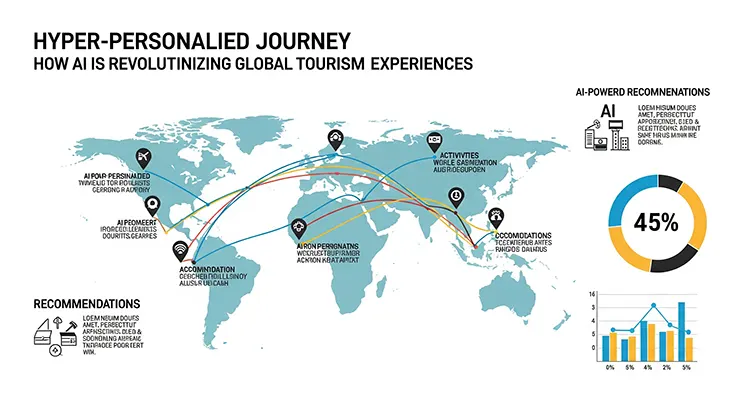The global tourism industry is undergoing a profound transformation, driven by the relentless advancement of Artificial Intelligence (AI). Gone are the days of one-size-fits-all travel packages; AI is ushering in an era of hyper-personalized experiences, fundamentally reshaping how individuals plan, book, and enjoy their journeys. For global tourism businesses, this shift presents both immense opportunities and complex challenges.
At its core, AI’s impact on personalized travel stems from its unparalleled ability to process and analyze vast datasets. By leveraging machine learning algorithms, natural language processing (NLP), and predictive analytics, AI can understand individual preferences, past behaviors, and real-time trends to deliver highly tailored recommendations and services.
Key Impacts of AI on Personalized Travel Experiences:
- Tailored Itinerary Creation: AI is a game-changer for trip planning. By analyzing a traveler’s interests, budget, desired activities, and even social media activity, AI-powered platforms can curate bespoke itineraries that perfectly align with their unique profile. This moves beyond generic suggestions to recommend hidden gems, local experiences, and dining options that truly resonate with the individual.
- Dynamic Pricing and Personalized Offers: AI algorithms constantly analyze market demand, booking patterns, and competitor pricing to offer dynamic pricing. This ensures competitive rates for travelers while maximizing revenue for businesses. Moreover, AI enables hyper-targeted marketing campaigns, delivering personalized discounts and promotions directly to potential travelers based on their Browse habits and stated preferences.
- Enhanced Customer Service and Real-time Support: AI-powered chatbots and virtual assistants are revolutionizing customer support. Available 24/7, these intelligent systems can handle a high volume of inquiries, manage bookings, provide instant confirmations, and offer real-time assistance during a trip. This frees up human agents to address more complex issues, leading to significant improvements in efficiency and customer satisfaction.
- Smarter Navigation and In-Destination Experiences: AI is making travel within a destination smoother and more immersive. AI-powered navigation apps provide real-time traffic updates, suggest optimal routes, and even predict delays. Beyond logistics, AI-powered tour guides can use augmented reality to provide rich historical context and localized information, while real-time recommendations adjust to weather changes, local events, or even a traveler’s mood.
- Predictive Analytics for Proactive Solutions: By analyzing historical data and current market conditions, AI can predict travel trends and potential disruptions. This allows businesses to proactively address issues like flight delays, recommend alternative routes, or even suggest different destinations based on forecasted demand. This foresight enhances traveler convenience and mitigates potential frustrations.
- Streamlined Operations and Efficiency: Beyond customer-facing applications, AI optimizes backend operations for tourism businesses. From automating check-ins and managing inventory to predicting maintenance needs for aircraft or hotels, AI significantly improves operational efficiency, reduces costs, and minimizes human error.
Challenges and Considerations:
Despite the undeniable benefits, the widespread adoption of AI in personalized travel comes with its own set of challenges:
- Data Privacy and Security: The collection and analysis of vast amounts of personal data raise significant concerns regarding privacy and security. Businesses must implement robust cybersecurity measures and ensure transparent data handling practices to build and maintain traveler trust.
- Algorithmic Bias and Fairness: AI algorithms can inadvertently perpetuate biases present in the data they are trained on, potentially leading to unfair recommendations or pricing for certain groups of travelers. Ethical considerations and ongoing auditing are crucial to mitigate such biases.
- Integration with Legacy Systems: Integrating new AI technologies with existing, often disparate, booking and operational platforms can be a complex and daunting task for global tourism businesses.
- Over-reliance on Technology and Loss of Human Touch: While AI enhances efficiency, there’s a risk of travelers becoming over-reliant on technology, potentially diminishing the sense of adventure and self-discovery. Striking a balance between AI-driven automation and preserving the human element in personalized service, especially for luxury or complex travel, remains vital.
- Job Displacement: The automation of routine tasks by AI raises concerns about job displacement within the industry. Businesses need to invest in retraining and upskilling their workforce to collaborate effectively with AI tools.
The Future of Personalized Tourism:
Looking ahead, AI’s role in personalized travel is poised for even greater sophistication. We can anticipate:
- More Sophisticated AI Agents: Virtual concierges will become even more intelligent, learning individual tastes, proactively planning itineraries, booking activities, and providing seamless real-time assistance.
- Immersive Experiences with Generative AI and VR/AR: Generative AI will create highly personalized travel guides and even immersive visuals to preview destinations. Combined with Virtual Reality (VR) and Augmented Reality (AR), travelers will be able to “experience” destinations before booking, or enhance their on-site exploration with interactive overlays.
- Sustainable and Inclusive Travel: AI can help travelers make more eco-conscious choices by suggesting eco-friendly accommodations and optimized routes to reduce carbon footprints. It can also identify off-the-beaten-path destinations to alleviate overcrowding, promoting more sustainable tourism.
AI is not just a technological enhancement; it is a fundamental shift in how global tourism businesses will operate and how travelers will experience the world. By embracing AI responsibly and thoughtfully, focusing on ethical deployment, data security, and maintaining a human touch where it matters most, the tourism industry can unlock unprecedented levels of personalization, efficiency, and satisfaction for travelers worldwide. The future of travel is undeniably intelligent, and it’s here to stay.





